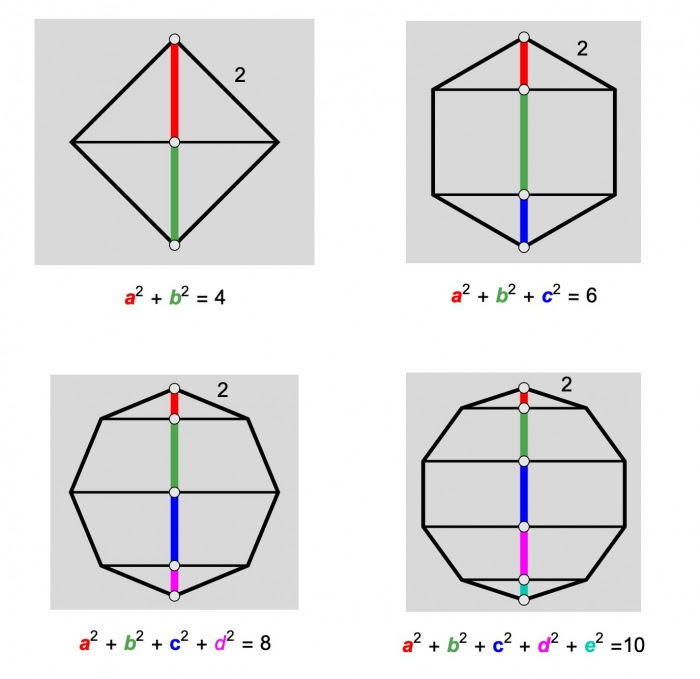Problem
For a regular polygon with n sides (n even) and side-length 2, prove that the sum of the squares of the segments along a vertical line as in the diagram is n.
 Remarkably, the same identity works for an odd number of sides. But the geometry in the two cases is a little different, so the main problem is for the even case only.
Remarkably, the same identity works for an odd number of sides. But the geometry in the two cases is a little different, so the main problem is for the even case only.
Solution
A regular polygon with n sides where n is even has n=4k or n=4k+2 sides. The coloured line segments are the projections of the polygon sides onto the y axis.
Case: n=4k
Let a regular polygon with n=4k sides and side length 2 be oriented such that its center is at the origin and both the x and y axis are lines of symmetry.Let the sides of the polygon be numbered from 1 to 4k in anti clockwise direction starting from the side with one vertex on the positive x axis and another vertex in the first quadrant. Let xi and yi be the lengths of the projections of side i on the x and y axis respectively. We have xi2+yi2=22 for all i∈{1,…,4k}. We also have xi+k=yi and yi+k=xi because the side i+k is perpendicular to side i (the angle between them is 4k2πk).
The sum we are interested in is
i=k+1∑3kyi2=i=1∑2kyi2
due to symmetry.
We also have
i=1∑2kyi2=i=1∑kyi2+i=k+1∑2kyi2=i=1∑kyi2+i=1∑kxi2=i=1∑kxi2+yi2=k⋅22=4k=n
This completes the proof of the formula for the case where the polygon has n=4k sides.
Case: n=4k+2
Haven’t been able to find an elegant geometric proof yet 😊. A simple trigonometric proof is given below.
It is fairly straightforward 😉 to see that the required sum of squares of projections on the y-axis is
2i=1∑k(2sin4k+2(2i−1)π)2+4=2i=1∑k(2−2cos2k+1(2i−1)π)+4=4k+4−4i=1∑kcos2k+1(2i−1)π=4k+4−sin2k+1π2i=1∑ksin2k+12iπ−sin2k+12(i−1)π=4k+4−2sin2k+1πsin2k+12kπ=4k+2
This completes the proof of the formula for the case where the polygon has n=4k+2 sides.
 Remarkably, the same identity works for an odd number of sides. But the geometry in the two cases is a little different, so the main problem is for the even case only.
Remarkably, the same identity works for an odd number of sides. But the geometry in the two cases is a little different, so the main problem is for the even case only.